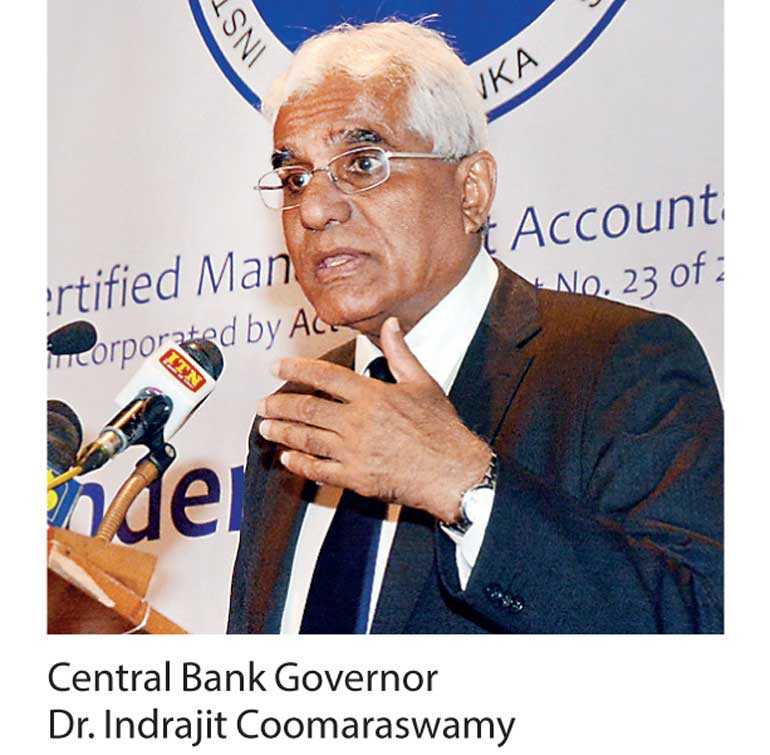Tuesday Feb 17, 2026
Tuesday Feb 17, 2026
Friday, 8 June 2018 00:00 - - {{hitsCtrl.values.hits}}


By Maleesha Sulthanagoda
Central Bank Governor Dr. Indrajit Coomaraswamy last week addressed the economic development of the country during the Institute of Certified Management Accountants of Sri Lanka (CMA) Founder’s Day Oration.
The Governor spoke on the progress that has been made to stabilise the economy and the growth rate while stressing that there is more to be done.
“On stabilisation, if you look at the key categories which reflect the stability of the economy, inflation is well within our target. In fact the headline inflation of the CCPI as of April was 3.8%. Weather driven supply disruption went to a spike in food inflation rate which grew headline inflation unto 7.8%. That was in March and the prices of two food items in particular rice and coconut were affected but now the supply situation has improved. The inflation is also within the band and despite the adjustment to administer prices of fewer gas cooked food we don’t anticipate the situation going beyond the 4 to 6% band. It will challenge the upper bound of the band by July but we don’t anticipate it going above it. So if inflation is an index of stability on the domestic front, we are indeed in pretty good shape,” he mentioned.
He also tackled the increase of the current account deficit and the targeted current account balance for the year during his oration.
“If you look at the external front, the current account balance targeted for last year was 2.1% of GDP but we ended up with 2.6% of GDP. Two of the three main items which led to the increase of the current account deficit This was almost entirely due to weather driven disruption as three successive seasons of cultivations being affected by the weather,” he commented.
According to Dr. Coomaraswamy, the other item that paved for the current account deficit was the increase of gold imports. “There was a sharp increase of the imports of gold because there was a large opportunity to arbitrage the tariff differential between India and Sri Lanka. So people were importing gold to Sri Lanka and smuggling it off to India. That has been adjusted by tariffs being increased in Sri Lanka,” he added.
He also discussed the foreign exchange reserve target for the year stressing on the improved quality of the reserves. “At the end of 2016 reserves were about $6 billion; at the end of 2017 it was about $7.95 billion and most important is not the increase of volume but the increase of quality by reducing liabilities. We expect to end the year with $9.5 billion of foreign exchange reserves,” he said.
As stated by the Governor while the economy is currently stable, it is important to secure and improve the economy. To carry out these tasks the Government has introduced various frameworks. “The Government is bringing in four frameworks to consolidate the stabilisation. The idea is to first introduce these frameworks and then try to institutionalise them. On the fiscal side, the Government is on a revenue advancement driven fiscal consolidation process. The idea of this is to bring the overall budget deficit down to 3.5% of GDP. Last year the target was missed, almost entirely due to flood relief. The CB will also move toward being a Flexible Inflation Targeting regime while bringing in legal and accountability frameworks to make sure everything runs smoothly. On the exchange rate, we are moving towards a flexible management of the exchange rate. We are working on groundwork to ensure more transparency so that everybody will know how the exchange rate is being managed. And the final thing is the Liability Management Act. We have big challenges such as our external debt obligations. In the past ten years, we went out and aggressively borrowed from abroad on commercial accounts. It is a very challenging position we’ve found ourselves in now. The Liability Management Act will give us greater flexibility to manage the external debt,” he declared.
He also pointed out the liabilities and weaknesses of the Government budget: “There are also some structural weaknesses in the Government budget. Over the years the Government budget has been the main source of instability in the Sri Lankan economy. The Sri Lankan economy has a high budget deficit, high inflation, high nominal interest rates and all of these have come from the excess demand generated from the unsustainable budget deficits,” he continued.
Dr. Indrajit Coomaraswamy was also the Chief Guest of the CMA Founder’s Day Oration.
CMA, the national professional management accounting institution was set up in 1999 with assistance from CMA Canada (now CPA Canada) was incorporated by Act of Parliament No. 23 of 2009. It comprises currently comprises over 15,000 students and 2,500 member who are Associates and Fellows of the institution.
CMA is a member of the South Asian Federation of Accountants (SAFA) and serves the Governing Board of SAFA once 2010. It is also a member of the International Federation of Accountants (IFAC) which is global institution.
In 2014, the Cabinet of Ministers gave the CMA qualification the official recognition for recruitment to the State Corporation and private sector.
Pix by Upul Abayasekara